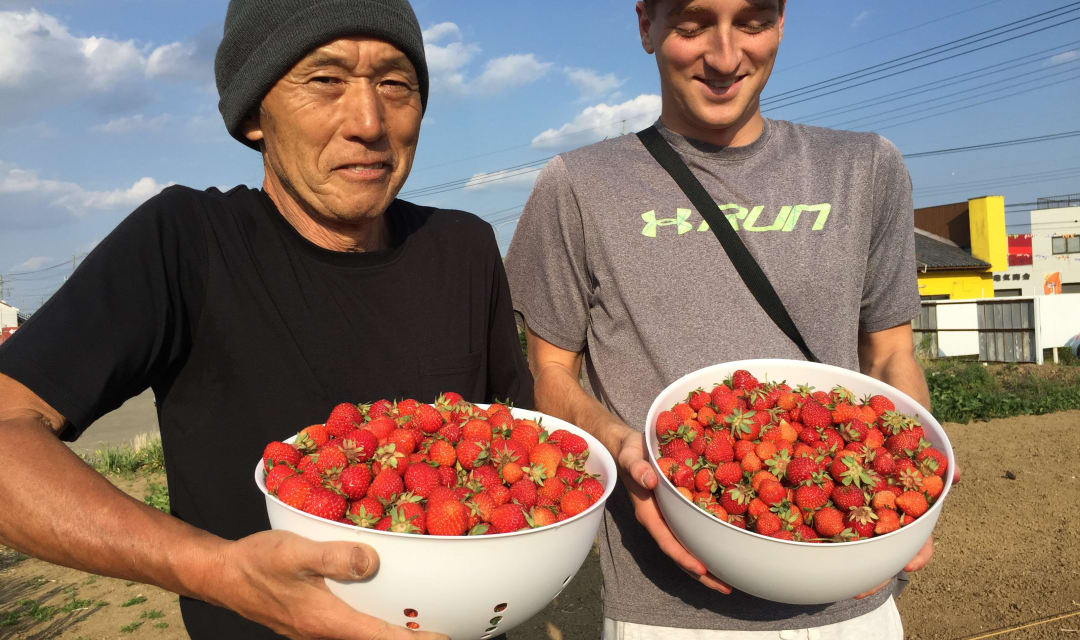Sustainable Travel in Japan
Sustainable travel needn’t involve camping under the stars or biking your way around the country. By supporting local businesses and respecting the environment and local culture, travelling responsibly is easy. 
Green eating
Sustainable food is an area where Japan really shines. Seasonal eating is a big part of the culture, and traditional restaurants tend to locally source as many ingredients as possible. Additionally, vegan and vegetarian food are becoming increasingly popular in Japan’s major cities. Though it’s still not exactly mainstream, with a little research you can find restaurants that serve plant-based meals. By WWOOFing, you'll be offered free meals and accommodation in exchange for helping your hosts
By WWOOFing, you'll be offered free meals and accommodation in exchange for helping your hostsEco-friendly stays
To get well and truly off the tourist trail, try WWOOFing. In exchange for food and a place to stay, you help your host with anything from organic farming, restoring traditional homes or running an environmental center. Not only do you give something back, but you get to make meaningful connections with the local community too. For sustainable living inspiration, visit Kamikatsu in Tokushima. This pretty town, surrounded by mountains and rice paddies, has made headlines by becoming practically zero-waste. Locals go to admirable lengths to avoid incinerating waste, separating their trash into 34 categories. They also leave clothes and household items they no longer need at an exchange, called a “kurukuru” in the town, so others can pick up those items for free. Visitors to the town are invited to come and take goods, too. Rise & Win brewery takes the reduce. reuse, recycle ethos to the next levelAnother kurukuru shop in the town sells upcycled items, such as clothes and bags, made from unwanted clothes and other textiles. Even the town’s brewery, Rise & Win, follows the reduce, reuse, recycle mantra. They use yuzu peel that would otherwise be thrown away to flavor craft beer and reuse the grain to make granola. Additionally, all the bottles used are returnable. Its very cool-looking building is made from recycled materials and won the WAN (World Architecture News) Sustainable Buildings Award in 2016. If you can’t get to Kamikatsu, get a feel for the brewery at its Tokyo-based taproom, instead.
Rise & Win brewery takes the reduce. reuse, recycle ethos to the next levelAnother kurukuru shop in the town sells upcycled items, such as clothes and bags, made from unwanted clothes and other textiles. Even the town’s brewery, Rise & Win, follows the reduce, reuse, recycle mantra. They use yuzu peel that would otherwise be thrown away to flavor craft beer and reuse the grain to make granola. Additionally, all the bottles used are returnable. Its very cool-looking building is made from recycled materials and won the WAN (World Architecture News) Sustainable Buildings Award in 2016. If you can’t get to Kamikatsu, get a feel for the brewery at its Tokyo-based taproom, instead.  I Was A Kimono make pretty jewellery from discarded traditional clothing
I Was A Kimono make pretty jewellery from discarded traditional clothingSustainable souvenirs
One of the easiest ways you can support local businesses is to shop for local produce when buying souvenirs. Support local artisans by buying their arts and crafts, or local farmers by purchasing jams and sauces. Waste items are reworked into fashionable pieces by Japanese brand, ModecoFor something a little more unusual, check out upcycling brands like Modeco which take waste materials and turn them into beautiful stationery, clothes and accessories. For something really special try I Was A Kimono, an online store that gives new life to old kimono, reworking the fabric into handcrafted accessories and other decorative items.With a little research, it’s easy to turn your holiday to Japan into a sustainable one.
Waste items are reworked into fashionable pieces by Japanese brand, ModecoFor something a little more unusual, check out upcycling brands like Modeco which take waste materials and turn them into beautiful stationery, clothes and accessories. For something really special try I Was A Kimono, an online store that gives new life to old kimono, reworking the fabric into handcrafted accessories and other decorative items.With a little research, it’s easy to turn your holiday to Japan into a sustainable one. source from
2019/9/18
JNTO
Ashley Owen
URL:https://www.japan.travel/en/blog/sustainable-travel-in-japan/